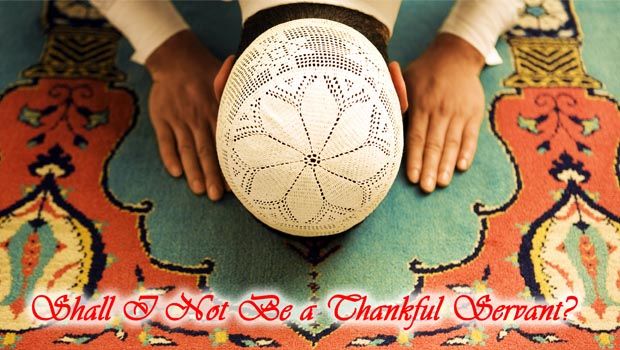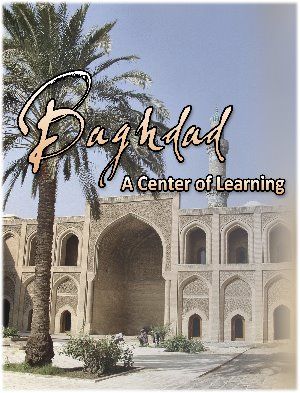Let’s go back in time. Back to Madinah, through the masjid and to the Prophet’s home. We can imagine him there, in the darkness of night, praying to his Lord. He is crying as he recites the ayaat of the Qur’an. He has been standing for so long that his blessed feet have swelled and the skin is cracking. Many of us would wonder the same thing that A’ishah, his beloved wife, (radi Allahu anha) asked him afterward. She said, “O Prophet of Allah, why do you undergo so much hardship despite the fact that Allah has pardoned for you your earlier and later sins?” He (sal Allahu alayhi wa sallam) responded, “Afala akuna abdan shakura?” (Should I not prove myself to be a thankful servant?) We learn from this hadith that gratitude is shown through deeds, and must not remain solely in our hearts. Gratitude must be manifested in our thoughts, attitudes, and words, and in our prayers; and then it must be substantiated by action. The Prophet (sal Allahu alayhi wa sallam) was not commanded to worship to this degree but rather it was a complete act of devotion and thankfulness to Allah (SWT).
If we say that we love Allah and that we are thankful to Him, then our actions must support that
When we want to thank someone, we go the extra mile to make them happy, especially when they are beloved to us. We go to great lengths to show our parents, spouse, or friend that we appreciate them. We offer our help without their asking. We plan time to spend together. We give them gifts without expecting one in return. We do whatever will make them happy. We show our love and appreciation through our actions. Yet, how can we claim that we love Allah when we do not often act this way with Him? What about the times that we do not abide by His Rulings? Or we hardly go beyond the bare minimum of worship. Or we do not honor His Book. There might be times that we swear by His Name in vain. Or we are not shy to sin in front of Him while we are shy when other people are watching. What about when we delay our daily conversations with Him, and when we finally do go to pray, we do it as fast as we can – rushing back to what we think is more important than Him. Would we ever claim to love our mother, spouse, or friend if we treated them this way? Would they feel that we love them and appreciate them if we treated them in similar manner? We should be ashamed if we treat our family and friends better than we do our own Creator, the Source of All-Goodness, the one who is most worthy of our love and gratitude.
Allah (SWT) does not need us or our worship at all. We are not harming Him or benefiting Him in any way by worshipping Him, by obeying or disobeying Him. He does not need anyone or anything, rather He is Self-Sufficient. It is we who are needy in all ways and entirely dependent upon Him for our survival and fulfillment and, ultimately, our salvation. If we are thankful servants, we would recognize that He is always deserving of praise. If we say that we love Allah and that we are thankful to Him, then our actions must support that. If instead our actions are careless and ungrateful, then we are simply good at saying what we don’t genuinely mean.
What is Shukr?
As a creation, we are wired to love those who give to us when it is done with genuine caring about us and our well-being and happiness. In an authentic hadith, the Prophet (sal Allahu alayhi wa sallam) taught us, “Give gifts and you will love one another.” Linguistically, shukr is used to describe a healthy cow – a cow that has visible signs of nourishment. Islamically, the scholars define shukr as the mentioning of Allah’s blessings upon the slave’s tongue, the slave’s recognition of these blessings in his heart, and obedience of the limbs due to these blessings.
Being thankful to Allah does not mean to only say “alhamdulillah” or doing a quick sajdah when we feel blessed. The Prophet (sal Allahu alayhi wa sallam) taught us through his statement to A’ishah as mentioned above that we must show our thankfulness to Allah. We have to strive to demonstrate it. The Qur’an in many verses instructs us be grateful (2:151, 29:16, 31:12). We also learn from the Qur’an that shukr is by action, manifesting outwardly what resides in the heart. Allah (SWT) says to the family of Dawud (alayhi salaam): “Work, O family of David, in gratitude” (34:13). Imam ibn al-Qayyim (rahimahullah) states, in reference to this verse, that there are three branches of shukr:
Knowledge: This is the foundation of shukr. We must have knowledge of the fact that Allah (subhanahu wa ta’ala) is the One who bestows upon us the countless blessings of this life. With knowledge, we will attribute all of our blessings to Him, including the opportunities to prove our eman during challenging times. Some people, in their spiritual ignorance, attribute the good things in their lives to their own merit, and when they are faced with difficulty or hardship, they attribute that to Allah. Without sound knowledge, one cannot be properly grateful.
Recognition and awareness: The slave reveres Allah and His favors with his tongue – by remembering and praising Him through supplication, and keeping a vitality of awareness and recognition of His greatness in his heart. It is reported in Tafsir al-Qurtubi that Dawud (alayhi salaam) said, “O my Lord! How can I be grateful to You when gratitude is a blessing from You?!” Allah (SWT) responded to him, “Now you have shown true gratitude” (i.e., he recognized that all blessings are from Him).
Deeds: The slave works in gratitude by being an obedient slave to Allah (subhanahu wa ta’ala). It is reported in Tafsir al-Tabari that Abu Abdur-Rahman al-Hubaly (rahimahullah) said, “Prayer is shukr, fasting is shukr, and any deed done for the sake of Allah is shukr.”
Imam ibn al-Qayyim further states that the pillars of being grateful to Allah are submission of the believer to Allah; love of Him and acknowledging and praising Him for His favors; and refraining from utilizing the favors in a way displeasing to Allah.
Benefits of Shukr
Allah calls mankind ungrateful in many ayaat in the Qur’an, declaring that only a few of His slaves are grateful. It is easier for us to be heedless of His blessings because being a thankful slave requires being attentive, conscientious, and devoted to purifying of the heart and seeking the pleasure of Allah. When we do show gratefulness to Allah, He blesses us in many ways. Allah will increase us in blessings. He ta’ala says, “And [recall] when your Lord proclaimed: ‘If you are grateful, I shall certainly increase [My blessings on] you, and if you are ungrateful, then My torment is surely severe’” (14:7). Also, Allah rewards those who are thankful. He (SWT) says, “Allah will give reward to the thankful” (3:144). That rewarding encompasses being saved from punishment. Allah (sub?anahu wa ta’ala) tells us in the Qur’an, “The people of Lot denied the warning. Indeed, We sent upon them a storm of stones, except the family of Lot – We saved them before dawn —as a favor from Us. Thus do We reward he who is grateful” (54:33-35). If we are seeking the pleasure of Allah, then we will make daily effort to be grateful. Allah (SWT) tells us, “And if you are grateful, He is pleased with you.” (39:7)
Taking Steps to Demonstrate Shukr
Knowing what shukr means and what its benefits are, we should take action to be among al-shaakireen. We can assess ourselves to see how grateful we are, not just in principle but in practice. Not just in a vague and generic way (“I’m so grateful to Allah SWT for everything in my life”), but in the nitty-gritty way of examination and transformation of the self on a daily basis (“Oh, if I am grateful to Allah SWT, I will practice right now in this minute being more patient with my kids”; or “Let me pause here and remember that the Prophet said to forgive even one’s servant 70 times a day…so why am I yelling at my beloved and insulting her?”)
For many of us, extra deeds or greater effort seems difficult because we are so used to the little we do. Don’t think that you cannot do more, but rather remember the hadith qudsi: “When my slave walks to Me, I run to him.” If you take that first step, which is the most difficult, Allah will guide and facilitate your ongoing efforts. It’s time we push ourselves to do more for Allah (SWT). It’s time that we refuse to accept the bare minimum from ourselves. It’s time that we set great goals for our deen just as we do for our education, career, and family life. And we can seek the help of Allah by means of du‘a. The Prophet (sal Allahu alayhi wa sallam) taught us to say: “Allahumma a’inni ‘alaa dhikrika wa shukrika wa husni ebadatika — O Allah, help me to remember You, to be thankful to You and to worship You in the best way.”And it is important to say it like we mean it, beseeching Allah (SWT) from the depth of the heart to make us among His few slaves that are grateful.
And we must remember that nothing comes without sincere and consistent effort. If we want to worship Allah more, we must strive for that with dedication. If we want to enjoy our worship, we must put in the effort. For some, praying and fasting is easy. For others, it is extremely difficult. If it is difficult for you, don’t interpret it to mean that you do not love Allah. Rather, it means that you have to strive more and work more to see the fruits of your labor. Allah (subhanahu wa ta’ala) says, “And those who strive for Us – We will surely guide them to Our ways. And indeed, Allah is with the doers of good (29:69). Allah (subhanahu wa ta’ala) used the word “jaahadu” here, meaning they strive and work hard for the sake of Allah (SWT).
To demonstrate, and at the same time, increase our gratitude, we can all do something extra in one way or another. Start slow and it will become easier, insha’Allah. We must be willing to step outside our comfort zone to train ourselves, to purify our hearts, to improve our practice of the deen. Following are some suggestions:
If you can, fast three days every month; if not, fast at least one day.
If you want to pray qiyam (voluntary night prayer) but already struggle with fajr, stay awake after fajr to remember Allah and read Qur’an, even for 15-30 minutes, before heading back to sleep.
Keep your tongue moist with the remembrance of Allah by learning the du’as from the sunnah for various actions we perform throughout the day.
Always do your adkhar – a collection of supplications and remembrances to make after fajr and ‘asr prayers.
Keep a portion of the day, even 30 minutes, just to remember Allah – reading Qur’an, making du‘a’ and reflecting.
Thank those around you. It is stated in a hadith, “Whoever does not thank the people has not thanked Allah.”
Help others in your community. You can help at a soup kitchen, or prepare a meal for a needy Muslim in your community.
Make it your habit to not belittle any good deed. If you have a chance to do a good deed, however seemingly small, then do it. The Prophet (sal Allahu alayhi wa sallam) said in the hadith about the man who gave a drink to the thirsty dog that, “Allah thanked him for that deed and forgave him” (Bukhari).We learn from this that a small deed sincerely done for the sake of Allah can earn His forgiveness and appreciation.
Al-Shakur: The Most Appreciative
Remember that all your efforts and all your striving is not in vain. It may be difficult for you to fast those extra days. It may be hard for you to get to sleep early so you can wake up at night to pray. But do not forget the One you are worshipping! You are worshipping Al-Shakur, The Most Appreciative. He ta’ala does not only look at your deeds, but He looks at the intention and effort behind it. Imam al-Qurtubi (rahimahullah) explains this Name of Allah, Al-Shakur, by saying, “He accepts the little from their good deeds, and repays them with a great reward.”
He is Al-Shakur —He does not undervalue, overlook, or discount our efforts. He accepts our few deeds and gives us greater in return. He blesses us with something better when we restrain ourselves from anything harmful for His sake. Allah, Al-Shakur, not only rewards us for our deeds but He increases them because He appreciates our obedience to Him. He is Al-Shakur of our shukr! While we are struggling to show our thankfulness to Him, Al-Shakur is keeping account of all that we do, of all the effort we are putting in, of how much we sincerely want to worship Him in the best way. He will reward us with what we do not even deserve. Our deeds can never earn Paradise without the mercy and generosity of Allah (SWT), but this is how Al-Shakur shows His Appreciation to His righteous servants.
Remind yourself of the Day that Allah (subhanahu wa ta’ala) will, in finality, show His gratitude by saying: “Indeed, this is for you a reward, and your effort has been appreciated” (Qur’an76:22). We ask Allah (SWT) to make us of those who hear these words. May He make us among His truly grateful servants and we ask that He bless us with the dedication to worship Him, remember Him, and thank Him in the best and most beautiful ways. Ameen.






